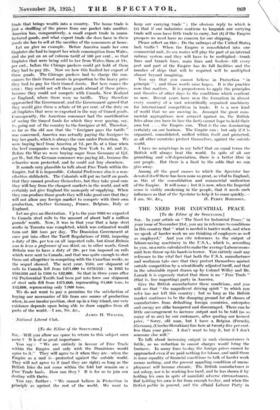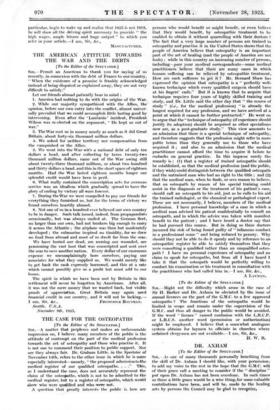- THE NEED FOR- INDUSTRIAL PEACE [To the Editor of
the SPECTATOR.] Sia,—In your article on " The Need for Industrial. Peace," in e your issue of November 21st, you say in reference to conditions in this country that "what is needed is harder work, and when we speak of harder work we are thinking of employers as well as cmployed." And. you cite references to the output of labour-saving Machinery in the U.S.A., which is, according to you, ona ratio calculated to make the average Labourecono- mist here throw up his hands in horror. You entirety omit any reference to the vita! fact that both the U.S.A. manufacturer and workman take care that they protect themselves against outside competition by a scientifically adjusted tariff, and that in the admirable report drawn up by Colonel Willey and Mr. Locock it is expressly stated. that there is no " Free Trade " (that is, free importing) party In America.
Give the British manufacturer these conditions, and you wilt see that " the magnificent driving spirit " to which you refer has not left this country ; but so long as the British Market continues to he the 'dumping ground for all classes of Manufactures from defaulting foreign countries, enterprise and energy are alike hampered and discouraged. There can be little encouragement to increase output and to be told (as so many of us are) by our customers, after quoting our keenest price, " Sorry, old man, but I have a Belgian (French), (German), (Czecho-Slovakian) line here at twenty-five per cent. less than your price. I don't want to buy it, but if I don't someone else will."
To talk about increasing output in such circumstances is futile, as no reduction in oncost charges would bring the busineSs. In many lines to-day the foreign prices cannot be appeciaehecl even if we paid nothing for labour, and until there is some equality of financial conditions to talk of harder work means nothing, and the present appalling condition of unem- ployment will beCome chronic. The British manufacturer is not-asleep, nor is he working less hard, and he has shown it by holding his own in spite of manifold adverse circumstances. But holding his own is far from enough to-day, and when the British public in general, and the official Labour Party in
particular,.begin to wake up and. realize that 1925 is not 1913, he will show all the driving spirit necessary to provide " the high wages, ample leisure and huge output" to which you refer in your article.—I am, Sir, &c., MANUFACTURER. -























































 Previous page
Previous page